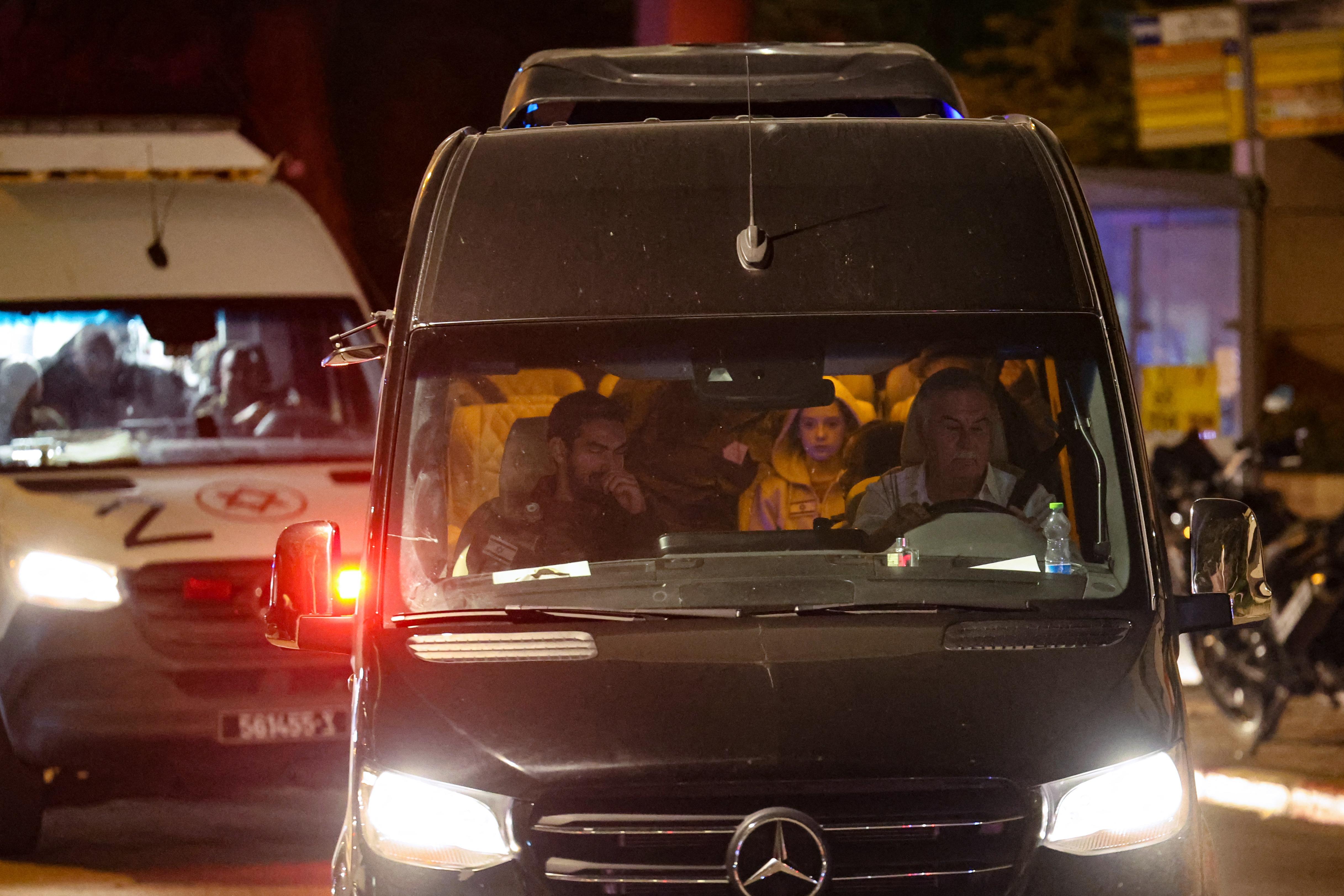 A convoy carrying Israeli hostages released by Hamas from the Gaza Strip arrives at the Sheba Medical Center in Ramat Gan, on November 26, 2023. Hamas on November 25, released a second group of Israeli and foreign civilians it had been holding hostage in the Gaza Strip in exchange for Palestinian prisoners, after an hours-long unexpected delay set nerves on edge. Israeli authorities said 13 Israelis and four Thai citizens had returned to Israel. (PHOTO / AFP)
A convoy carrying Israeli hostages released by Hamas from the Gaza Strip arrives at the Sheba Medical Center in Ramat Gan, on November 26, 2023. Hamas on November 25, released a second group of Israeli and foreign civilians it had been holding hostage in the Gaza Strip in exchange for Palestinian prisoners, after an hours-long unexpected delay set nerves on edge. Israeli authorities said 13 Israelis and four Thai citizens had returned to Israel. (PHOTO / AFP)
GAZA/JERUSALEM/AMMAN - About three dozen Palestinian prisoners released by Israel arrived in the West Bank on Sunday, following Hamas' release of 17 hostages in the second round of swaps under a cease-fire deal.
Late on Saturday, Israel received the second batch of hostages released from the Gaza Strip, including 13 Israelis and four Thais, who had crossed into Egypt and were en route to Israel, confirmed the Israel Defense Forces (IDF) in a post on its X account.
As part of the ongoing prisoner-hostage swap agreement with Hamas, Israel released 39 Palestinians -- six women and 33 minors -- from two prisons, reported the Palestinian news agency WAFA on Sunday
"After undergoing an initial medical assessment, they will continue to be accompanied by IDF soldiers as they make their way to Israeli hospitals, where they will be reunited with their families," said the IDF.
Thai Prime Minister Srettha Thavisin said on Sunday that the Thais in the latest release were in good health.
ALSO READ: Families’ relief as hostages freed under Hamas-Israel truce
"Everybody is safe, on the whole in good mental health and are able to speak normally," said the prime minister via social media X.
As part of the ongoing prisoner-hostage swap agreement with Hamas, Israel released 39 Palestinians -- six women and 33 minors -- from two prisons, reported the Palestinian news agency WAFA on Sunday.
The swap was scheduled for around 4 pm local time (1400 GMT) on Saturday. It was delayed for several hours after Hamas accused Israel of failing to meet the terms of a four-day humanitarian cease-fire agreement, which was agreed upon by the two sides on Wednesday after more than six weeks of bloody conflicts.
A Palestinian source told Xinhua that Hamas was expecting the delivery of "large quantities" of humanitarian aid to Gaza City and the rest of the northern part of the Gaza Strip, rather than providing supplies to the southern part of the enclave only.
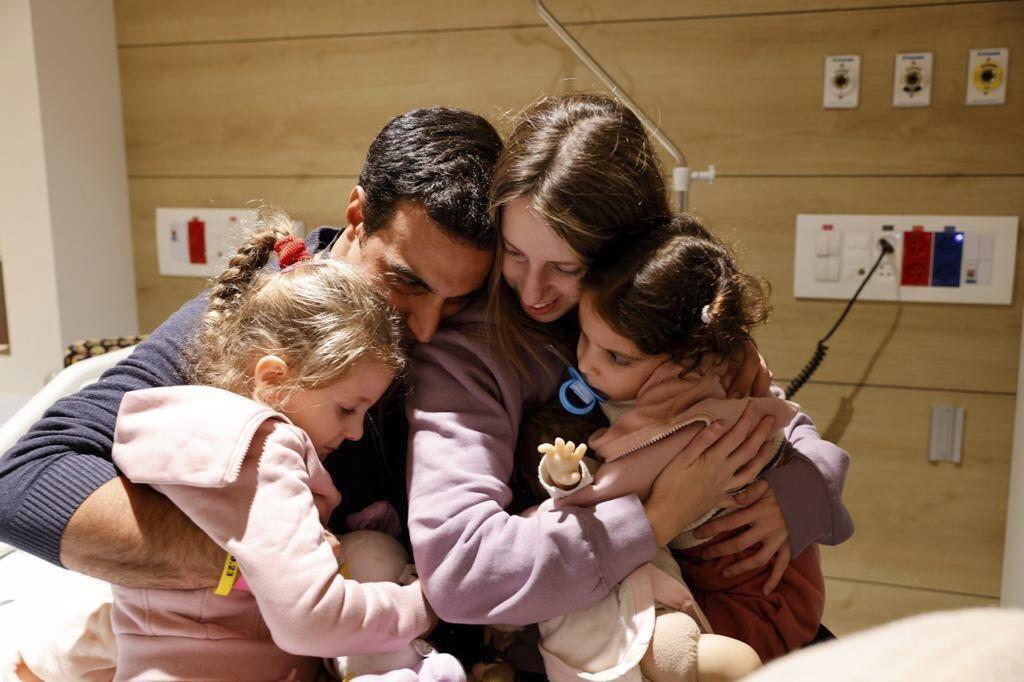 Aviv Asher, 2,5-year-old, her sister Raz Asher, 4,5-year-old, and mother Doron, react as they meet with Yoni, Doron's husband and their father, after they returned to Israel to the designated complex at the Schneider Children's Medical Center on Nov 24, 2023. A four-day cease-fire in the Israel-Hamas war began in Gaza on Friday with an exchange of hostages and prisoners. (HANDOUT / SCHNEIDER CHILDREN'S MEDICAL CENTER VIA AP)
Aviv Asher, 2,5-year-old, her sister Raz Asher, 4,5-year-old, and mother Doron, react as they meet with Yoni, Doron's husband and their father, after they returned to Israel to the designated complex at the Schneider Children's Medical Center on Nov 24, 2023. A four-day cease-fire in the Israel-Hamas war began in Gaza on Friday with an exchange of hostages and prisoners. (HANDOUT / SCHNEIDER CHILDREN'S MEDICAL CENTER VIA AP)
Meanwhile, the UN Office for the Coordination of Humanitarian Affairs said 61 truckloads of aid were delivered to northern Gaza on Saturday, the largest number since the outbreak of the Palestinian-Israeli conflict on Oct 7.
The aid included food, water and emergency medical supplies. Eleven ambulances, three coaches and a flatbed were delivered to Al Shifa Hospital in northern Gaza to assist with medical evacuations, it said.
Another 200 trucks were dispatched from the Israeli border town of Nitzana to the Rafah crossing. Of them, 187 entered Gaza by Saturday night local time. In addition, 129,000 liters of fuel crossed into Gaza, according to the office.
None of these deliveries would have been possible without the Palestinian and Egyptian Red Crescent Societies, it said, adding that the longer the humanitarian pause lasts, the more aid humanitarian agencies will be able to send into Gaza.
"We welcome the release of more hostages today and renew our call for the immediate and unconditional release of all hostages. And we hope the release of more Palestinian detainees brings relief to their families and loved ones," said OCHA.
ALSO READ: Aid, fuel enter Gaza as truce between Hamas, Israel takes hold
The OCHA warned that at least 1.7 million people have been displaced in the Gaza Strip and are facing the danger of significant spread of infectious diseases.
Nearly 80 percent of Gaza's population has become internally displaced, with approximately 896,000 displaced persons residing in 99 facilities in the central and southern parts of the region, the OCHA said.
Notable increases in certain diseases, such as diarrhea, acute respiratory infections, skin inflammation, and hygiene-related conditions like lice infestation, have been recorded due to the overcrowding and poor health conditions in UN shelters, said the statement.
It added that due to limited space in shelters in the south, most of the displaced men and older boys are compelled to stay outdoors, in schoolyards, or on the streets, next to the exterior walls of the shelters.
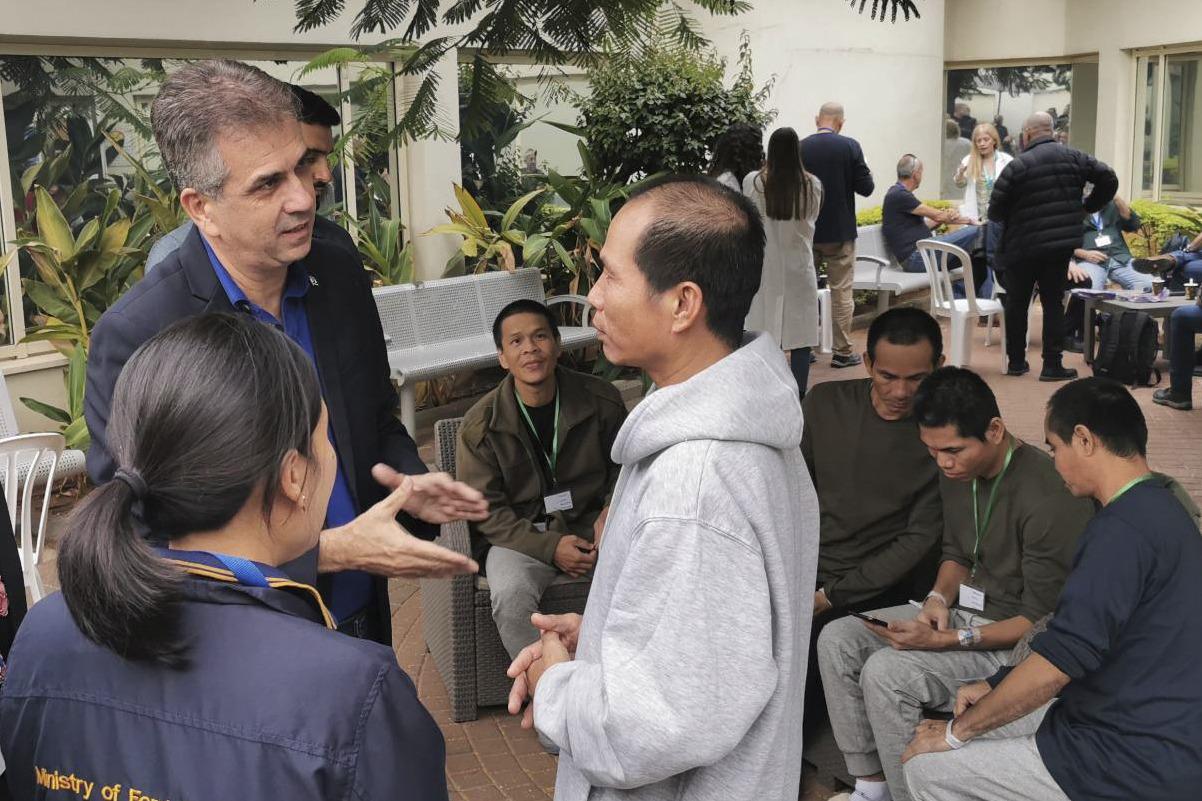 In this photo provided by Thailand's Foreign Ministry, Israel's Foreign Minister Eli Cohen, left, talks to one of the freed Thai hostages at the Shamir Medical Center in Israel, Nov 25, 2023. Hamas freed 10 Thai nationals seized in the group's surprise attack on southern Israel last month, releasing them alongside Israeli hostages who were part of the first swap under a new cease-fire deal. (HANDOUT / THAILAND'S FOREIGN MINISTRY VIA AP)
In this photo provided by Thailand's Foreign Ministry, Israel's Foreign Minister Eli Cohen, left, talks to one of the freed Thai hostages at the Shamir Medical Center in Israel, Nov 25, 2023. Hamas freed 10 Thai nationals seized in the group's surprise attack on southern Israel last month, releasing them alongside Israeli hostages who were part of the first swap under a new cease-fire deal. (HANDOUT / THAILAND'S FOREIGN MINISTRY VIA AP)
Around 400 Palestinians reportedly moved on Friday from Gaza City and its northern areas to the south through a "corridor" established by the Israeli army for the evacuation along the Salah al-Din Road, the main north-south traffic artery.
Hunger, the statement said, is the primary reason for the massive displacement, as Gazans residing in the north had not received any food assistance for weeks.
Gaza Municipality has called on the United Nations, the Red Cross, and other international organizations to urgently intervene so as to provide fuel and coordinate with local authorities to deal with garbage pile-up in Gaza City.
"The continued accumulation of waste will deepen the residents' suffering and exacerbate the environmental, health, and humanitarian catastrophe in Gaza City," said local authorities.
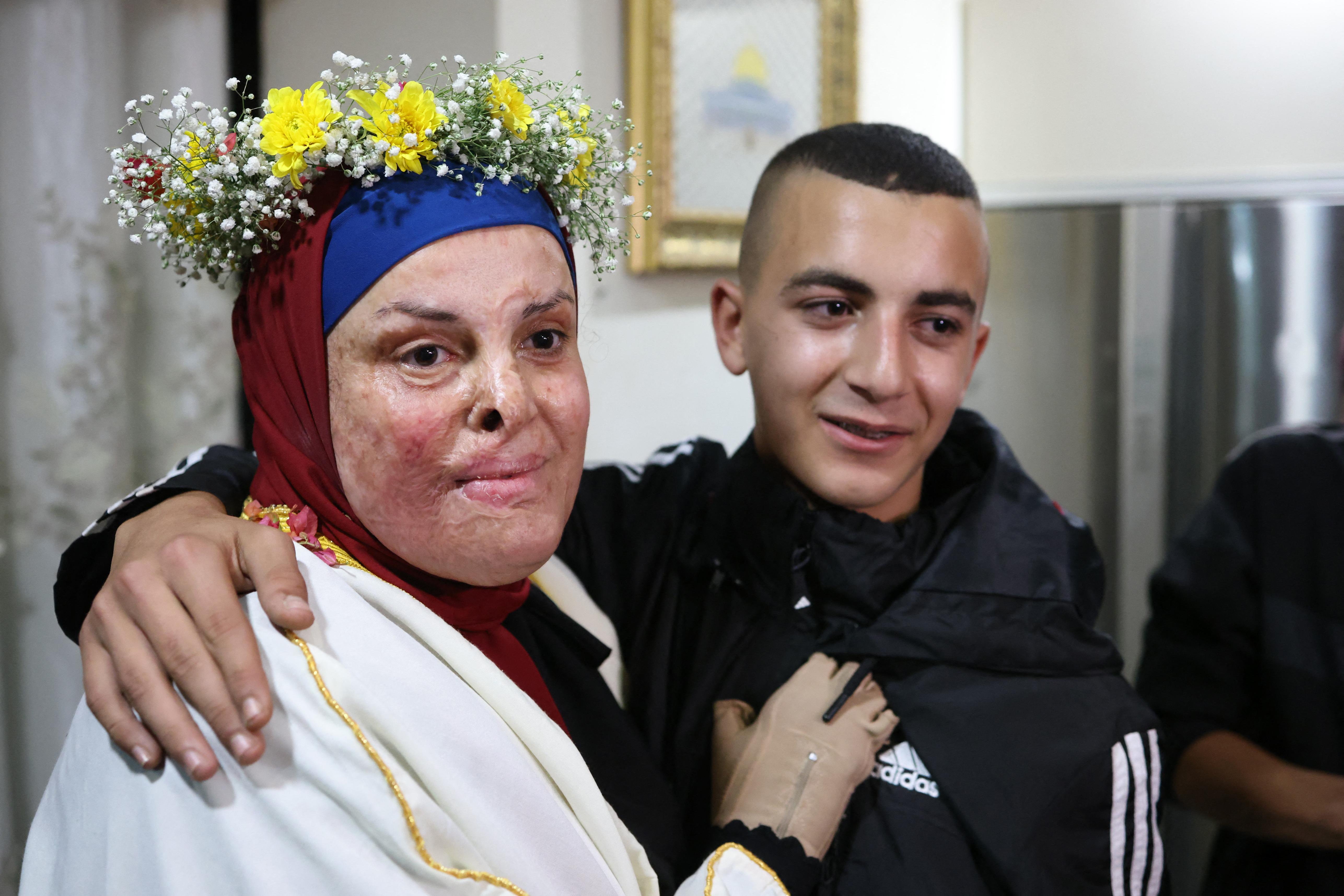 Prominent Palestinian prisoner Israa Jaabis arrives at her home in Israeli-annexed east Jerusalem early on November 26, 2023, after detainees were released from Israeli jails in exchange for hostages released by Hamas from the Gaza Strip. Hamas on November 25, released a second group of Israeli and foreign civilians it had been holding hostage in the Gaza Strip in exchange for Palestinian prisoners, after an hours-long unexpected delay set nerves on edge. Israeli authorities said 13 Israelis and four Thai citizens had returned to Israel. (PHOTO / AFP)
Prominent Palestinian prisoner Israa Jaabis arrives at her home in Israeli-annexed east Jerusalem early on November 26, 2023, after detainees were released from Israeli jails in exchange for hostages released by Hamas from the Gaza Strip. Hamas on November 25, released a second group of Israeli and foreign civilians it had been holding hostage in the Gaza Strip in exchange for Palestinian prisoners, after an hours-long unexpected delay set nerves on edge. Israeli authorities said 13 Israelis and four Thai citizens had returned to Israel. (PHOTO / AFP)
Also on Saturday, the foreign ministers of Jordan, Portugal, and Slovenia jointly called for the delivery of sufficient and urgent humanitarian aid to the besieged Gaza Strip, the Jordanian Foreign Ministry said in a statement.
The remarks were made during a trilateral meeting held in the Jordanian capital Amman to discuss measures to stop the ongoing Israel-Hamas conflict in the Palestinian coastal enclave. The meeting was attended by Jordanian Foreign Minister Ayman Safadi, Portuguese Foreign Minister Joao Cravinho, and Slovenian Foreign Minister Tanja Fajon.
ALSO READ: UNICEF: Gaza most dangerous place in the world to be a child
The ministers called for efforts to put an end to the humanitarian catastrophe and the suffering of Gazans, ensure the protection of civilians, and uphold humanitarian and international laws.
Safadi said the four-day humanitarian cease-fire between Israel and Hamas, which took effect on Friday, was "a step in the right direction" and must immediately lead to the cessation of conflict, the delivery of aid to all sectors, including those in the northern Gaza Strip, according to the statement.
The Slovenian minister underlined Jordan's important and strategic role in bringing about security, stability, and peace in the region, saying that her country shares the concerns of Jordan and the rest of the world about the developments in the West Bank.
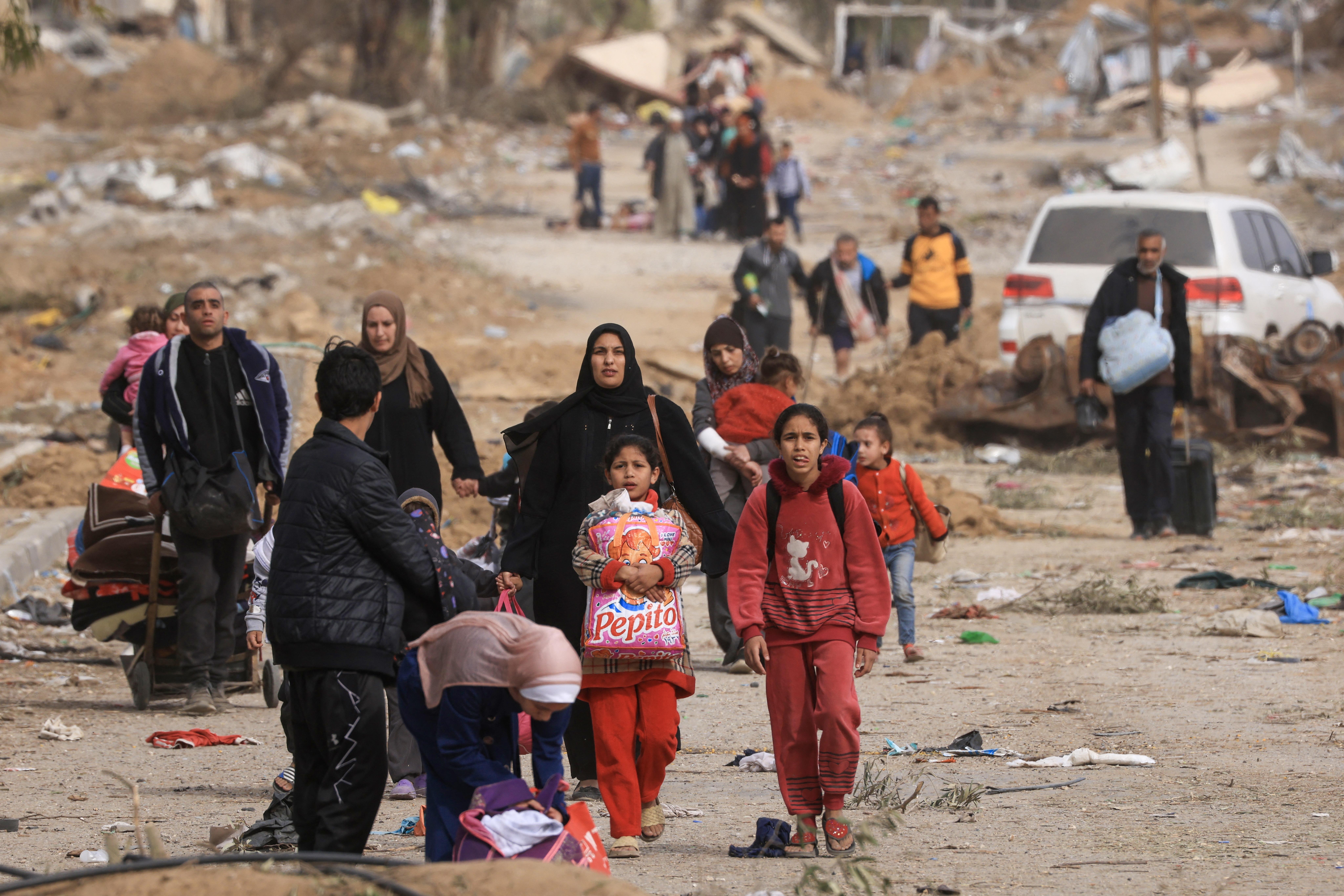 Palestinians leaving the north walk through the Salaheddine road in the Zeitoun district on the southern outskirts of Gaza City on November 25, 2023, on the second day of a truce between Israel and Hamas. (PHOTO / AFP)
Palestinians leaving the north walk through the Salaheddine road in the Zeitoun district on the southern outskirts of Gaza City on November 25, 2023, on the second day of a truce between Israel and Hamas. (PHOTO / AFP)
While calling for an immediate cease-fire in Gaza and the entry of the largest possible amount of humanitarian and relief aid into the enclave, Fajon also reaffirmed her support for a two-state solution as a way to resolve the conflict.
READ MORE: UN chief wants return of two-state solution after Gaza crisis
The Portuguese official thanked Jordan for its role in the United Nations to stop the Israel-Hamas conflict.
While rejecting the displacement of Gazans, Cravinho emphasized the need to extend the truce, stressing that diplomatic and political solutions are the only ways to resolve the conflict in the region.
The three ministers are scheduled to meet on Monday in Barcelona during the eighth Regional Forum for Ministers of Foreign Affairs of the Union for the Mediterranean, which will be co-chaired by Jordan and the European Union. The forum is expected to focus on ways to stop the Israel-Hamas conflict and discuss its serious consequences.


